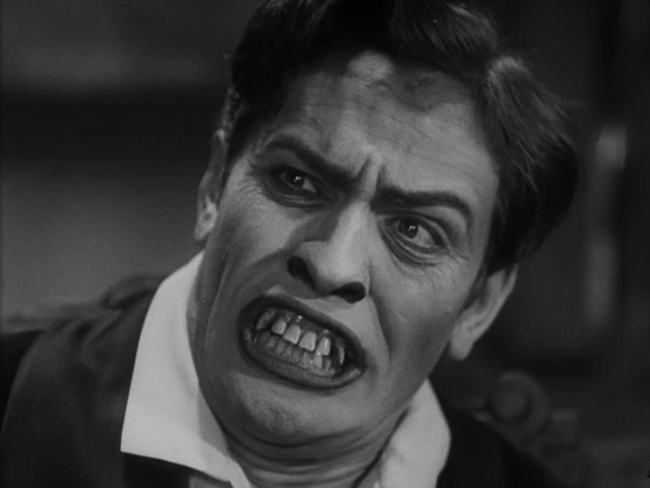
Intrepidity can be a double edged sword--this seems to be the main idea brought to the table in the 1931 Dr. Jekyll and Mr. Hyde, the first sound film adaptation of Robert Louis Stevenson's story. Fredric March gives a good performance as a Jekyll who's a courageous man of action but his Hyde is an unfortunate reversion to the hopping monkey of the 1912 film. Experiments with first person filmmaking prove more distracting than effective and, despite a movie stealing, distinctly pre-Code appearance by Miriam Hopkins, this version presents a much stiffer morality than previous versions.

We start out in Dr. Jekyll, looking through his eyes as he plays on a pipe organ before going to a mirror to finally reveal Fredric March in the role. Probably intended to make us feel a greater identification with the man, putting the camera directly in his perspective has about the same effect it usually has to-day; calling attention to the artificiality of filmmaking itself.

It's not until Jekyll is giving a lecture in an operating theatre that we step outside of him and thereby finally get an impression of this bold man--far from the simpering, nervous figure in the 1920 film, this is a man who clearly thinks he's got life figured out and he's perfectly comfortable imposing his will on others. This can be a good thing, as demonstrated in one scene where he helps an injured girl get the courage to walk again by denying her the use of crutches in spite of her pleas.

Again Jekyll has a fiancee, Muriel (Rose Hobart), and the two are quite openly, sincerely in love. They're both frustrated--but Jekyll much more so--by Muriel's father, Sir Danvers (Halliwell Hobbes), refusing to allow the marriage to occur until two months have passed. One sympathises with Jekyll being blocked by an old fashioned formality but his anger seems excessive, provoked likely because he's denied control over his own life for the first time, perhaps ever.

Walking home with Dr. Lanyon (Holmes Herbert), Jekyll spots a woman being attacked. The two gentlemen chase off the attacker and Jekyll carries the woman, Ivy Pierson (Miriam Hopkins), back to her apartment where there's some amusing dialogue about her garter.

When Lanyon walks in on Ivy kissing Jekyll, Jekyll laughs off Lanyon's criticism of his conduct, pointing out that it was she who kissed him. He goes further and says that he even enjoyed it and doesn't feel guilty about it, explaining, "We may control our actions but not our impulses." But it's here that he asserts the wish to gain complete control over those impulses and make himself pure.

The film makes it clear boldness can be even more hazardous to women. Ivy is shown performing in a music hall, exhibiting her sexuality as unselfconsciously as she had to Jekyll, and it's this that brings Hyde into her life. For all her boldness, she can but swoon helplessly before Hyde, her control of her sexuality but an illusion, an idea which was considered sexist for decades but seems to be gaining ground again. Personally I prefer Marlene Dietrich.

Jekyll and Hyde are two distinct identities in this one and there's not really a sense of Hyde fulfilling Jekyll's hidden desires as much as Jekyll's helplessness as this completely different person takes control of his life. In the end, he's pitiable but the film is nowhere near the psychological depths or horror of the novella or the 1920 film.

No comments:
Post a Comment